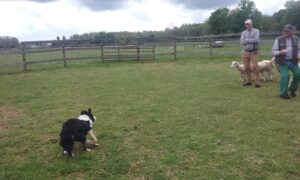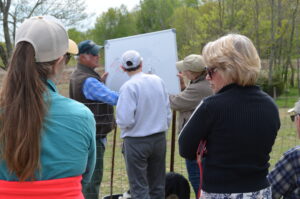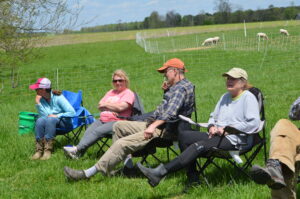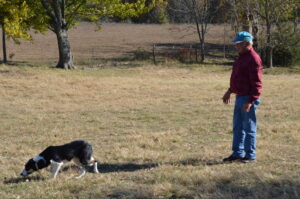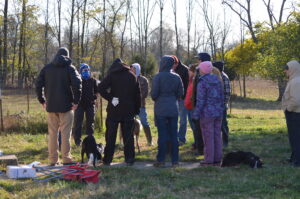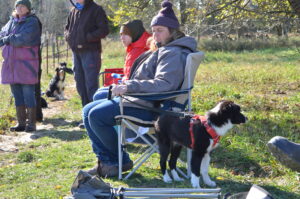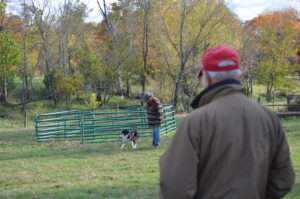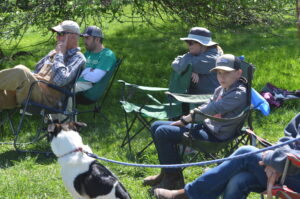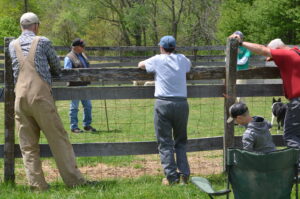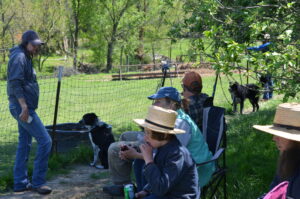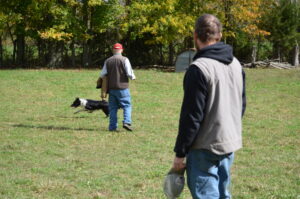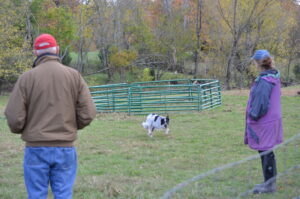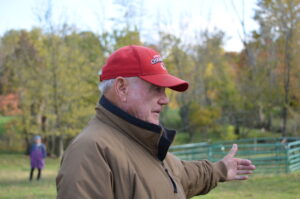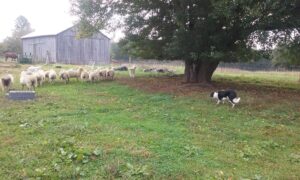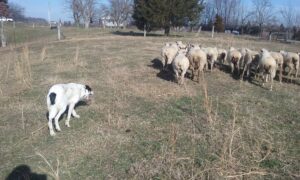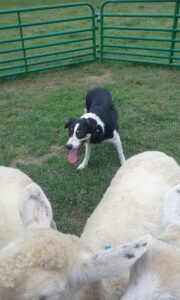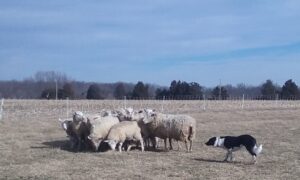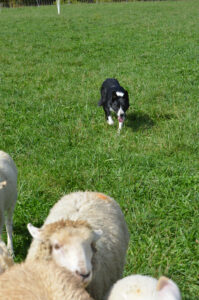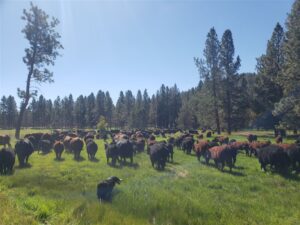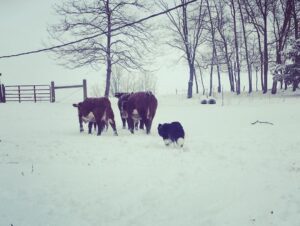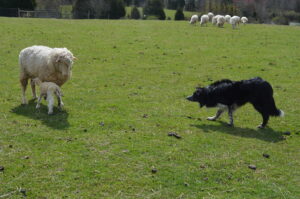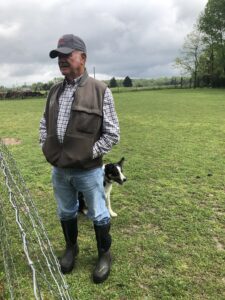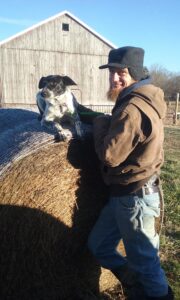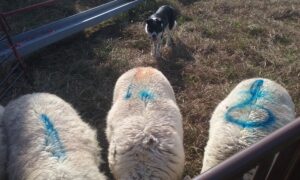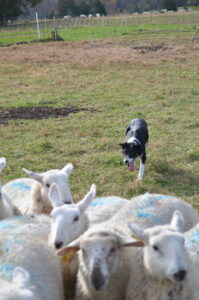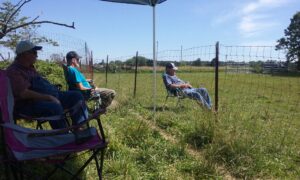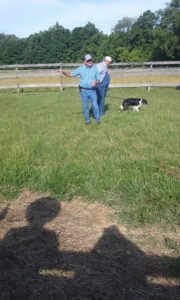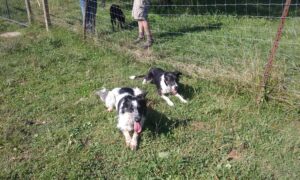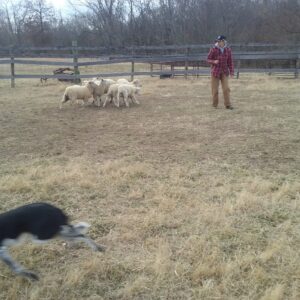Final report for FNC20-1244
Project Information
The farm is 100 acres - 40 tillable that is rented for crops, 30 wooded in a conservation/wildlife habitat with the remaining land pasture, homestead, and pond. The pasture has been rotationally grazed with portable fencing. The crop aftermath is also grazed sparingly in the fall. Ewes are lambed in April on pasture then moved to a fresh pasture as they lamb. Grazing rotation typically begins May 1. Working dogs are used in all livestock management from lambing, grazing, treatment of animals in pasture and barn facility, loading, feeding. I have had sheep for about 28 years and working dogs for 21 years.
We cover the foundational low stress management techniques helping livestock managers understand how livestock think, feel, move and what motivates them. We also cover foundational training on stock dogs using the dogs instincts to help with management tasks however each workshop is tailored to the individuals attending. We keep the group small enough to enable individual instruction to assist the handler/dog team meeting them where they are in their training/working journey and giving them the information need to progress. We understand no two dogs, people or operations are identical and every dog/handler learns a bit differently. By providing instruction in a group setting people are able to pick up information they need now and info they will use later or with another dog. Each day handlers internalize different core elements that they need but there is no way to predict what AHH moments each will have. By presenting the info in a variety of ways we optimize the chance of getting the information across. Our goal is to give them enough pieces and basic understanding to build a firm foundation that benefits them, their operation, and their stock.
I propose multiple hands-on skill workshops with bi-monthly newsletters and skill-building days to increase the knowledge and skills of low-stress handling of livestock with and without stockdogs. Livestock producers can increase their productivity and efficiency by understanding how stock move and think and mastering stockdog handling. Incorporating well-trained stockdogs that are capable of assisting in all areas of stock management requires continual learning, for both the person and the dog. This ongoing journey enables one person to increase the number of livestock managed, decrease the need for extensive infrastructure, and save time required for daily upkeep of stock and equipment. Marginal and hard to access land can be utilized and improved by rotational grazing because stockdogs enable simple, quick movement of livestock through rough terrain or unfenced areas providing many opportunities not before available which limits need for mowing, herbicides, distributes manure and improves soil health.
Workshops provide networking opportunities to exchange management information, support each other and opportunities to sell stock.
This project will reduce the cost of multiple continued learning opportunities to enhance low-stress livestock management knowledge and handling skills; with and without stockdogs. Increasing producers understanding of handling techniques and use of herding dogs assisting with stock management enables producers to better utilize their land, improve soils, overcome unique constraints allowing them to expand their operation, save them time, money, and stress while benefiting from the support of a like-minded community of livestock producers. Bimonthly newsletters centered on stockdog training / use and low-stress handling stock will enhance workshops, provide continued learning, address questions, and provide encouragement and support.
Cooperators
- - Producer
Research
Hands-On Learning Herding dogs will be worked in either a round pen, small paddock or pasture depending on skill level of dog and handler. Each team will be assessed to understand their strengths and challenges then help will be given to improve needed skills. Each team will work twice a day practicing new skills during workshops and skill-building days so they are confident and comfortable repeating skills at home. Workshops will be three consecutive days spring and fall with one-day skill-building opportunities offered monthly. I have been holding clinics for 10 years and this format works well.
Evident from a previous SARE Farmer Rancher grant - FNC17-1095 that I managed, livestock producers need separate instructions concerning how livestock think and move which will enable better handling of stock with and without a dog’s assistance. Livestock handling techniques will be discussed, demonstrated, and practiced. Demonstration and hands-on learning (without a dog) will be used with ewes and ewes and lambs and a small herd performing routine needed management skills such as tagging, banding, medicating, moving through pastures, into pens, and through working alley. Once handlers and their dogs have an adequate skill level they will work together to perform management tasks.
There is not a publication dedicated to understanding stock and herding dogs at this time. Most information about using dogs on stock is misinterpreted, misunderstood and given by inexperienced stockpersons or inexperienced herding trainers.
Newsletters will be produced giving a wide range of instruction, information, and checklists from a variety of well-known handlers/trainers/ stockmen to help readers understand communication between the dog, stock and themselves and assist them in continual forward progression and skill-building.
My home raised ewes and lambs will be used for this project because they understand how to move off dogs calmly and quietly.
Enclosed is an introductory training guide that I have put together.
LOW STRESS LIVESTOCK HANDLING1
I also have workshop and project information listed on my website.
Since much of this grant project focused on education and training, I have included results and discussion under the education section of this grant report.
Educational & Outreach Activities
Participation summary:
LOW STRESS LIVESTOCK HANDLING1
An introductory training guide
I also have workshop and project information listed on my website.
COVID restrictions in 2020 did impact the workshops. State restrictions mandated that we cancel the Spring 2020 workshop in April. However, easing of mandates allowed us to hold a smaller version of the clinic in June. All indications pointed toward Covid continuing to influence travel for the foreseeable future so we opted to proceed with a more local gathering and stock dog clinic in June and October 2020. Workshops and one day skill building days were advertised via word of mouth, posters at livestock stores, livestock markets, internet advertisements, and facebook group promotion Everything was held outdoors and socially distanced allowing people to remain safe and give them a much need mental break from the pandemic. Our June clinic had 15 in attendance with dogs, October had 25 people attending. Additional effort was made to follow up with everyone personally by phone to answer questions and address training challenges faced in the months following the clinics. Videos were posted online to stimulate discussion and newsletters were sent. I believe the pandemic fatigue and challenges limited the time people wanted to invest in more online training and time in 2020. Hopefully, we will have more interaction in 2021 using virtual methods since life is returning to more of a normal routine.
Once restrictions were lifted we also continued with the monthly gatherings offered. Attendance remained strong within the surrounding states' farming/stock dog community for these sessions. The one day monthly sessions were held when weather and covid restrictions allowed. These practice days were well attended by individuals within a 4 hour drive of the farm. The participants worked on skills that were difficult to accomplish at home. The assistance of a veteran handler enabled handlers to identify the problem with themselves and their training so they could accomplish the tasks and progress while working alone.
The pandemic continued to impact in-person training in 2021. We did have sustained interest but those farmers who felt comfortable traveling to the workshops were relatively local, predominately from IN and the surrounding states of OH, KY, IL, and VA, with workshops held in April and Oct. While we had fewer individuals attending, the smaller group enabled more intense personal instruction and increased group discussions. This added instruction and discussion proved very useful to help attendees understand how the foundational working dog skills of gathering, moving stock correctly, stopping, and calling off are vital to working stock in a low-stress manner. It was evident that not only did the herding skills need to be performed correctly by the dog, but the attitude of the dog also impacted the stock. Handlers were helped to see how the correct positioning by the dog was necessary to allow the stock time to think and react positively. Handlers were taught skills to correct the mechanics of how the dog moved. They were also taught what solutions would enable them to have the correct relationship with the dog so that the dog was working stock for and with the handler rather than for themselves.
Follow up with attendees was accomplished by phone conversations, video conferencing, email, and through the skill building days. Those people and dogs attending always make good progress during the 3 days. Some in attendance requested additional time to work on particular skills. An extra day was added to the workshops to accommodate requests. While not everyone was able to work in an extra day away from home and work, those that attended make incredible progress. The extra one and one instruction and discussion was able to tie all the skills together. Handlers cemented the information about how stock move and think and integrate the working dog to better utilize the dog to manage stock.
We put the dogs up one morning of the workshop to concentrate on learning how livestock think and what motives them. Armed with this information handlers were better able to read stock and move to the correct positions to encourage the sheep to move where they were needed.
Penning and sorting stock by an experienced dog and handler team was demonstrated to illustrate the importance of reading stock by both dog and handler. This pointed out where mistakes are commonly made - rushing stock, not allowing the adequate distance between dog and stock, and how tight and fast movements made by the dog upset stock. Handlers that had dogs further along in their training practiced penning sheep with the clinician giving individual assistance to both handler and dog.
The 2021 spring clinic was held at the end of April. Rather than 3 days, 4 were offered, and 22 people attended. A few folks came to observe for a day to gain information about using herding dogs with livestock. The 4th day served as an advanced day since all ten of the individuals had been working stock dogs for several years. The fall clinic was held at the end of October. We had 4 new folks attending. Each of those had a small flock of sheep. Fifteen handlers who have previously attended the workshops returned for this workshop.
One day practice sessions were held when folks could attend, averaging 7 sessions per year. These sessions were attended by 2 to 10 individuals enabling for deep discussion, personal attention, and demonstrations. These skill-building days enabled handlers and dogs to advance in the 6 months between workshops so everyone maintained and practiced skills worked on during the workshop sessions as well as took the needed next steps in their progression.
Learning Outcomes
The 4 workshops included discussions about puppy training, how to raise working dogs for easier training, and low stress livestock management.
We also added a low stress demo and hands on skill practice where we are asking people to move stock without the help of dogs to better understand livestock behavior and how our movement influences stock.
A small group of sheep was sorted out of the flock then moved through a series of pens and pastures to simulate everyday chores like rotational grazing, holding sheep for deworming, penning, and moving sheep to the barn. This was first demonstrated without a dog, then with a dog. Handlers were then asked to move sheep without a dog and then with a dog. This proved very eye-opening. People learned their stock moves partially out of routine rather than because they and their dog were in the correct positions. They became aware of how significant correct positioning and reading the stock helped with management.
The workshops are able to take whatever each livestock producer is struggling with and break down steps so they comprehend how to accomplish easier at home with less stress to themselves, the stock, and the dog.
Because each producer and their dog are at a different stage in learning, everyone benefits from watching each other. While their current dog may not be ready for some skills that other producers are working on, seeing the skills mastered will be helpful down the road.
Learning to read and understand livestock and as well as train and use a stock dog is a lifelong continual process. The skills learned during the clinic will be put to use to enable livestock management to become easier at home. With easier less time-consuming management flocks and herds can be expanded enabling a greater return on investments.
The workshops serve to build relationships within the group that are very helpful. We discuss our own operations sharing our struggles and insights that build a sense of community within the group. Individuals keep in touch and visit each other's operations further building community resources and insights as relationships strengthen.
Everyone that attends goes home with valuable insights and makes new friendships that continue outside of the workshop.
Project Outcomes
In fall of 2020 we added an obstacle course that simulated farm chores. The participants were asked to move sheep with their dogs help through gates, panels, and into a pen. This allowed people to identify weaknesses in their handling and training skills and come away with an increased appreciation for paying attention to the stock. Many said this was an eye opening experience for them.
Here is what other attendees said when they were asked to write a brief note detailing if the workshops and skill building days have impacted their operation -
Letter 1 To whom it may concern,
I wanted to let you know what the SARE supported working dog and low stress livestock workshops have meant to me and my operation.
I work for an organic dairy in central OH in addition to having my own farm. At the dairy we milk a herd of Jerseys and raise feed for the cattle. I have a beef herd, sheep flock, and occasional raise hogs on my place. All the stock are rotationally grazed on both farms.
It is difficult having a full time job with livestock as well as my own animals and making time for my family. The integration of a working dog has given me a working partner that is by my side all day for whatever chores we need to tackle and makes completion of jobs simpler, saves me a ton of time and stress.
I used a worked dog in the past when I worked on another farm but that dog was an adult and owned by the farm. Beau taught me a lot but having my dog was much tougher than I realized. I had bought a local pup and was looking for someone to help me figure out how to train him. That’s how I met Denice. She invited me down to her place with my young dog. She let me work several of her older dogs to get a feel for things which was very helpful. I made it down to Denice’s as much as I could but honestly, it wasn’t enough. It was evident that my dog was not going to be talented enough for the work I needed to get done.
I ended up purchasing a nice young female from Denice that was started in training. Even with a great dog and understanding livestock it was clear I needed help figuring out how to communicate with my dog.
The past two years I have attended workshops at Denices and joined others on working days. It is a 3 hr drive to her place, but so worth the time and effort – even when we are only able to get away for the day. Attending the success with stock dogs clinics and those workshops have made a huge difference in both my understanding of working dogs and how to solve problems at home. To really soak up knowledge and start to understand things we need several days in a row to acquire new skills, the workshops are great.
Denice is always available, even if I call, she takes time to talk me through problems. Her experience is evident, she always has helpful suggestions on training and livestock – dog interactions. The entire group at her place is filled with great people that I count among my friends. It's cool having livestock-dog folks to share experiences with and talk about the successes and failures.
I sure couldn’t raise the amount of stock I have without a dog and wouldn’t have been able to train her so well without the workshops and workdays.
I now assist my neighbors and pass on the knowledge that I have gained.
Branden Prendergast
Greenfield, Ohio
Letter 2 -
I live on a family farm in northern KY. My brother and his family have a small calf operation where they grow calves and I and my family run a small flock of sheep consisting of 35 to 40 ewes. I have a full time off the farm job and raise grass fed lamb that I see direct to local customers.
Depending on the time of year, I move my flock either daily or every three days or so to fresh pasture. Simply put, I could not operate the way I do without herding dogs.
Before attending these clinics, I had limited experience with dogs (mostly unsuccessful) which I had gained by trying to read books or watch videos on my own. Since attending these clinics, I have gained so much hands-on experience and my skills have vastly improved to the point where I have even taken on some outside dogs to train in order to make a little extra money.
My whole philosophy on how to train and handle these dogs has changed and this of course filters down to the sheep themselves. The sheep are now handled with less stress and commotion. In fact, before I started going to these clinics, my father actually told me he was concerned I would have a heart attack because I got so frustrated and angry while trying to move sheep!
These clinics have also helped me a great deal on a personal level. I'm 42 and in my lifetime, our town has gone from mostly all farms to just us. We are now surrounded by roads and houses. Most of our effort on the farm is now spent to pay the taxes and insurance but we do our best to hang on to preserve the farm for my children.
These clinics have afforded me the opportunity to meet genuinely nice, good people who I can get ideas and advice from. While our operations and goals are varied, we share lots of information during the clinics. I have learned about how to train and work dogs in the process of attending the clinics, but I have also been challenged to think more about the stock and the bigger picture.
Regardless of the fact that every person’s operation is different, the group is very supportive and encouraging to each other. Everyone freely shares tidbits of information I can put to use. We also are able to network within the group. We buy and sell livestock; our herds and flocks benefit genetically.
More than that, we all benefit economically and socially. I look forward to these clinics and the positive impact they have on me, my dogs and my stock.
I appreciate the support of SARE and see the impact of these educational opportunities in each participant.
Casey Ryan
Walton, KY
Letter 3
There are several ways these SARE supported clinics have helped me as a second generation cattle producer.
For starters, patience. Too many times when trying to make cattle go where I want, it ends up with me being mad and the cattle headed to the opposite end of the field.
I met Denice Rackley through a simple phone call when I was looking for my first cattle dog. While she didn’t have a dog that she thought would be suited to my situation, she immediately offered assistance. She has become my stock dog mentor without me spending any money to purchase a dog from her. Now she even helps me with sheep management questions as well.
I know I will never be without a stock dog now that I have had the needed assistance to begin this journey.
The cattle have so much more respect for the dog than me. Safety is a huge concern when working cattle, the dog adds layers of safety. I can be on the outside of the pen and the cattle will just move away from the dog. I can get more done without help other than my dog. I am off the farm with a demanding full time job for days at a time. With the help of my young dog I can do a lot in the time I do have.
A lot of times I'm by myself and can't be in two places at the same time. I can send the dog around to move the cattle and I can run the gate. I can be assured that my wife can safely handle the cattle if need be since the dog is there at home.
I have also added sheep to the operation. At first, it was simply to train the dog. Now we are expanding the flock. They are improving the cattle pasture and providing another revenue stream for us.
I have much to learn, my dogs needs training also since she is young. Coming up to the clinics is super enjoyable since everyone is trying to improve and is supportive. Each clinic I learn more and we improve. The cattle are happier, my dog is happier since I am finally figuring things out, and my wife and I are happier.
I know I can call on Denice with questions. She always takes the time to assist me. Being 7 hours away I can’t make it up for personal help as often as I would like but because she has years of experience, I am able to ask questions and she explains things so I understand even over the phone.
When I did make it up in the middle of summer, she took three days with me and helped me one on one. My dog and I have come a long way in a year. We have made enough progress to convince me the many benefits a good dog can have on a livestock operation. It is worth the investment in time and travel to find great people who have been down this road a time or two and are willing to open up their farms and lives to help others.
You wouldn’t find people better to support than Denice and Jack, they go out of their way to ensure each person attending the clinics are successful.
Josh Bowling
Hiton, WV
Everything with livestock and working dogs is a continual learning experience. Just when we think we have seen it all, a curveball comes out of nowhere. Management of stock is always evolving, operations need to evolve as well. Margins on farms are small, most producers have off the farm jobs and families that require time and attention. The shift in farming methods toward sustainable practices only works if we put as much effort into taking care of the land as we do the livestock.
Rotational grazing requires more fencing and more moving of stock. Reducing grain and high cost feeds increase potential profit but that is only feasible if the stock get the care and attention they need rather than simply filling the feeder and forgetting it. Well bred and trained herding dogs are able to help get the work accomplished with less stress and in less time. Having a dog accompany you each and every trip to the pasture and barn gives you confidence that you can accomplish anything that is needed. Simply having a dog lending support is a huge comfort, even when they never leave the pickup.
The greater understanding producers have about working and training dogs and the more committed they are to learn how livestock think and move the easier, more enjoyable, and more profitable life on the farm can be. Hands on opportunities need to be offered on a continual basis that support improved stewardship of land, greater understanding of livestock, and improved management skills.
